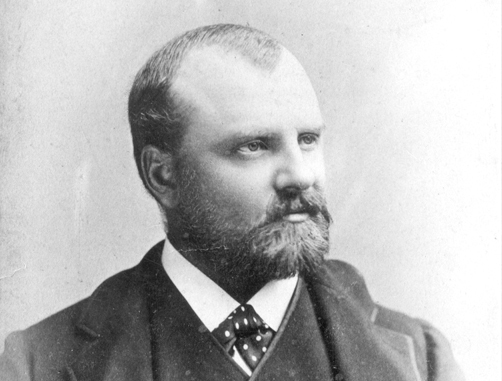194-The Double Life of Clarence King
Futility Closet
Greg Ross
4.8 • 748 Ratings
🗓️ 26 March 2018
⏱️ 33 minutes
🧾️ Download transcript
Summary

American geologist Clarence King led a strange double life in the late 1800s: He invented a second identity as a black railroad porter so he could marry the woman he loved, and then spent 13 years living separate lives in both white and black America. In this week's episode of the Futility Closet podcast we'll consider the extraordinary lengths that King went to in order to be with the woman he loved.
We'll also contemplate the dangers of water and puzzle over a policeman's strange behavior.
Intro:
Artists Tim Noble and Sue Webster arrange household trash to cast shadow self-portraits.
Sources for our feature on Clarence King:
Martha A. Sandweiss, Passing Strange, 2009.
Bill Croke, "The Many Lives of Clarence King," American Spectator, Feb. 28, 2011.
John Koster, "He Tried to Solve Earth’s Mysteries And Left a Few Mysteries of His Own- Clarence King," Wild West, February 2014.
William Grimes, "Recalling a Geologist, Adventurer and Raconteur Whom Henry Adams Looked Up to," New York Times, Feb. 22, 2006.
David L. Beck, "A Geologist's Secret Life," St. Petersburg Times, April 12, 2009.
William Howarth, "Sex, Lies and Cyanide," Washington Post, May 20, 1990.
Michael K. Johnson, "Passing Strange," Western American Literature 44:4 (Winter 2010), 404-405.
Martha A. Sandweiss, "Ada Copeland King," American National Biography (accessed March 23, 2018).
Thurman Wilkins, "Clarence Rivers King," American National Biography (accessed March 23, 2018).
"American Lives: The 'Strange' Tale of Clarence King," Morning Edition, National Public Radio, Aug. 18, 2010.
Annette Gordon-Reed, "Color Blind," Washington Post, Feb. 22, 2009.
Jennifer Greenstein Altmann, "Sandweiss Unearths a Compelling Tale of Secret Racial Identity," Princeton University, Dec. 17, 2009.
Baz Dreisinger, "A Transracial Man," New York Times, March 5, 2009.
"American Lives: The 'Strange' Tale of Clarence King," WBUR News, Aug. 18, 2010.
Elinore Longobardi, "Two Lives," Columbia Journalism Review, Feb. 4, 2009.
"King Peak," Antarctica: An Encyclopedia, 2011.
Listener mail:
Wikipedia, "Bhopal Disaster" (accessed March 23, 2018).
Alan Taylor, "Bhopal: The World's Worst Industrial Disaster, 30 Years Later," Atlantic, Dec. 2, 2014.
An example of a current safety manual warning of the dangers of rust in steel tanks, from Gillian Brent.
"The Case of the Rusty Assassin," Maritime Accident Casebook (accessed March 25, 2018).
Steve Selden, "Polar Bear Encounters on Rise in Churchill," Churchill Polar Bills, Feb. 29, 2016.
A Colorado bear breaks into Rocky Mountain Chocolate Factory.
This week's lateral thinking puzzle was contributed by listener Scott Miller. Here's a corroborating link (warning -- this spoils the puzzle).
You can listen using the player above, download this episode directly, or subscribe on iTunes or Google Play Music or via the RSS feed at http://feedpress.me/futilitycloset.
Please consider becoming a patron of Futility Closet -- on our Patreon page you can pledge any amount per episode, and we've set up some rewards to help thank you for your support. You can also make a one-time donation on the Support Us page of the Futility Closet website.
Many thanks to Doug Ross for the music in this episode.
If you have any questions or comments you can reach us at [email protected]. Thanks for listening!
Transcript
Click on a timestamp to play from that location
| 0:00.0 | Welcome to the Futility Closet Podcast, forgotten stories from the pages of history. |
| 0:13.8 | Visit us online to sample more than 10,000 quirky curiosities from artistic shadows to a whispering wall. |
| 0:20.5 | This is episode 194. I'm Greg Ross. |
| 0:23.3 | And I'm Sharon Ross. American geologist Clarence King led a strange double life in the late |
| 0:28.9 | 1800s. He invented a second identity as a black railroad porter so he could marry the woman he |
| 0:34.4 | loved, and then spent 13 years living separate lives in both white |
| 0:38.1 | and black America. In today's show, we'll consider the extraordinary lengths that King went to |
| 0:43.4 | in order to be with the woman he loved. We'll also contemplate the dangers of water and puzzle over |
| 0:49.9 | a policeman's strange behavior. |
| 1:02.1 | And a quick programming note, we'll be off next week, so look for the next episode on April 9th. |
| 1:08.0 | Clarence King was such a dynamic figure during this country's expansion that it's amazing he's been forgotten as thoroughly as he has. He was a geologist, |
| 1:11.2 | mountaineer, and author who mapped the West after the Civil War, helped champion the national |
| 1:15.4 | park system, surveyed the path of the Union Pacific Railroad, and wrote a best-selling book |
| 1:19.5 | about his adventures. He dined at the White House and counted Henry James and Brett Hart among |
| 1:24.1 | his friends. The historian Henry Adams called him the most remarkable man of |
| 1:27.5 | our time, and John Hay, the Secretary of State under McKinley and Roosevelt, called him the best and |
| 1:32.1 | brightest man of his generation. He was born in Newport, Rhode Island, to a distinguished |
| 1:36.3 | family. One of his father's ancestors had come to the Massachusetts Bay Colony in 1637, and his |
| 1:41.4 | mother could trace her ancestry back to signers of the Magna Carta. |
| 1:47.8 | But he spent most of his life as a gentleman scientist, cobbling together an income from government appointments, writing projects, and rich friends. |
| 1:51.2 | He got a doctorate in chemistry at Yale in 1862, but was uncertain what to do with himself. |
| 1:56.4 | Shortly after that, he heard one of his teachers read a description of Mount Shasta in |
... |
Please login to see the full transcript.
Disclaimer: The podcast and artwork embedded on this page are from Greg Ross, and are the property of its owner and not affiliated with or endorsed by Tapesearch.
Generated transcripts are the property of Greg Ross and are distributed freely under the Fair Use doctrine. Transcripts generated by Tapesearch are not guaranteed to be accurate.
Copyright © Tapesearch 2025.

